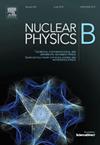在量子计算机中捕捉Page曲线和黑洞纠缠动力学
IF 2.8
3区 物理与天体物理
Q2 PHYSICS, PARTICLES & FIELDS
引用次数: 0
摘要
量子计算机是一种新兴技术,有望成为未来探索基础物理各个方面的重要工具。因此,我们提出了量子计算机是否可以帮助我们研究佩奇曲线和黑洞信息动力学的问题,这一直是基础物理学的一个关键焦点。在这方面,我们严格检查了量子比特传输模型,这是IBM超导量子计算机上黑洞蒸发的一个玩具量子比特模型,以阐明这个问题。具体来说,我们利用一个有效的随机幺正电路实现了黑洞置乱动力学的量子模拟。此外,我们采用基于交换的多体干涉协议和随机测量协议来测量该模型中霍金辐射量子比特的纠缠熵。最后,通过将量子误差缓解技术整合到我们在IBM量子硬件上具有挑战性的纠缠熵测量协议的实现中,我们准确地确定了量子比特传输模型中的r本文章由计算机程序翻译,如有差异,请以英文原文为准。
Capturing the Page curve and entanglement dynamics of black holes in quantum computers
Quantum computers are emerging technologies expected to become important tools for exploring various aspects of fundamental physics in the future. Therefore, we pose the question of whether quantum computers can help us to study the Page curve and the black hole information dynamics, which has been a key focus in fundamental physics. In this regard, we rigorously examine the qubit transport model, a toy qubit model of black hole evaporation on IBM’s superconducting quantum computers, to shed light on this question. Specifically, we implement the quantum simulation of the scrambling dynamics in black holes using an efficient random unitary circuit. Furthermore, we employ the swap-based many-body interference protocol and the randomized measurement protocol to measure the entanglement entropy of Hawking radiation qubits in this model. Finally, by incorporating quantum error mitigation techniques into our challenging implementation of entanglement entropy measurement protocols on the IBM quantum hardware, we accurately determine the Rényi entropy in the qubit transport model, thus showcasing the utility of quantum computers for future investigations of complex quantum systems.
求助全文
通过发布文献求助,成功后即可免费获取论文全文。
去求助
来源期刊

Nuclear Physics B
物理-物理:粒子与场物理
CiteScore
5.50
自引率
7.10%
发文量
302
审稿时长
1 months
期刊介绍:
Nuclear Physics B focuses on the domain of high energy physics, quantum field theory, statistical systems, and mathematical physics, and includes four main sections: high energy physics - phenomenology, high energy physics - theory, high energy physics - experiment, and quantum field theory, statistical systems, and mathematical physics. The emphasis is on original research papers (Frontiers Articles or Full Length Articles), but Review Articles are also welcome.
 求助内容:
求助内容: 应助结果提醒方式:
应助结果提醒方式:


